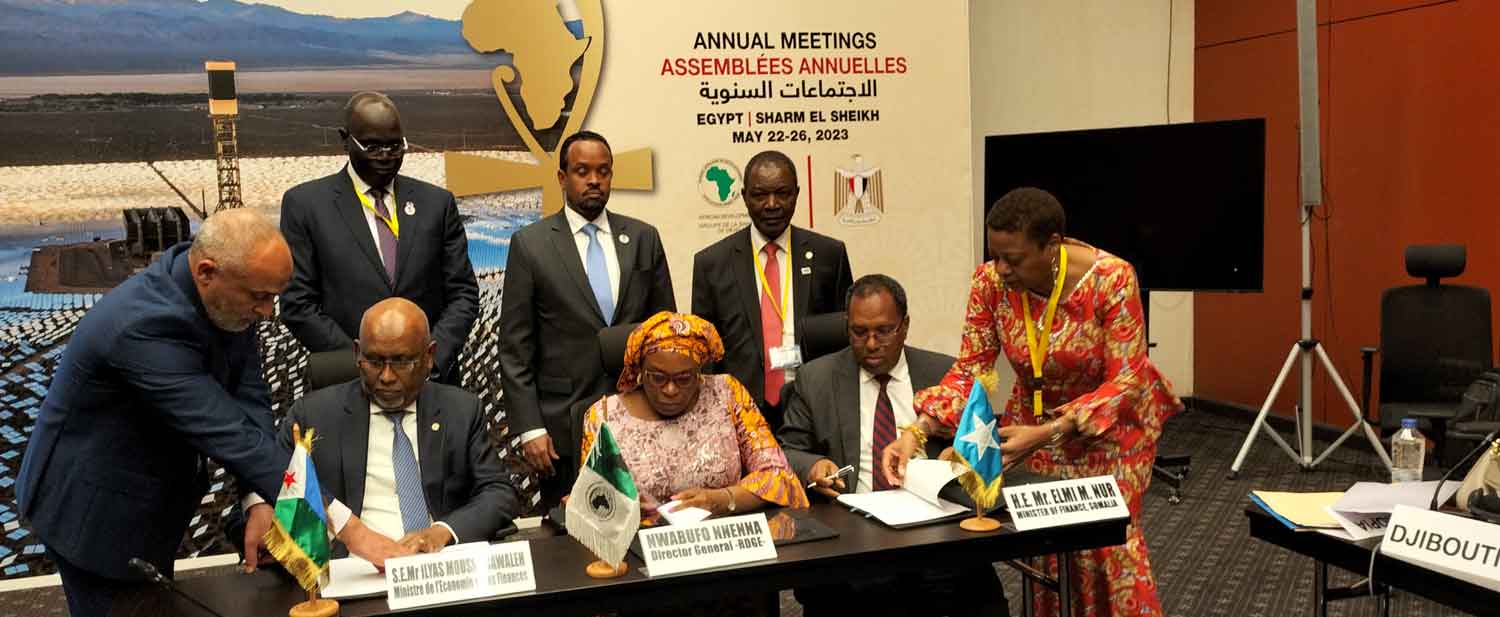Private sector crucial for development of the Horn of Africa, Finance ministers say

GOOBJOOG NEWS: Finance Ministers from the Horn of Africa have underscored the importance of tapping into the private sector to address gaps in financing of priority projects in the region.
The ministers from; Somalia, Ethiopia and Kenya participated in the 17th Horn of Africa initiative (HoAI) Ministers of Finance roundtable hosted by the African Development Bank at the sidelines of the recently concluded AfDB annual meeting in Sharm El Sheikh, Egypt.
The Bank’s Division Manager for Private Sector, Hazem Elwassimy, presented the roadmap, and titled, Private Sector Mobilisation: A Roadmap for a Government-Enabled, Private Sector Led Green Growth in the Horn of Africa.
He highlighted that debt sustainability in the region was a major issue leading to a gap in the financing of priority projects from public resources.
The average total public debt-to-GDP ratio in East Africa reached 87 percent in 2021, from 79 percent in 2020, way more than the IMF’s recommended threshold of 40 percent for developing countries.
High debt to GDP ratio limits the available space to finance the priority projects and programmes, including those under the Horn of Africa package.
As such, the meeting underscored the importance of collaboration between government and private sector entities in shaping policies and regulations that will encourage the private sector to thrive and participate in debt reduction. “Private sector engagement leverages the capabilities of the private sector to drive economic growth, job creation, poverty reduction and addressing social and environmental challenges,” adds the report.
For a start, the region must look at the low-hanging fruits, in this case being the collaboration with the chambers of commerce in the respective countries, said Prof Njuguna Ndung’u, Kenya’s Cabinet Secretary for National Treasury and Economic Planning.
“They are well connected. Let them cite their pain points in working in the region, then we can come together and agree on how to resolve the issues,” he stated.
Djibouti’s Finance minister, Ilyas Moussa Dawaleh, reiterated the importance of creating dialogue between HoAI governments with the region’s private sector. This, he said, “would ensure a harmonised process that would map out bottlenecks, priorities and challenges in private sector participation.”
On his part, South Sudan’s Minister of Finance and Planning, Dier Tong Ngor, mentioned that it was critical to harmonise the movement of people and goods/trade in the region “to achieve economic integration with a strong private sector presence”.
A communiqué following the meeting rubber-stamped the value of private sector, and called for the development of an operational plan.
“Private sector has the potential to bring its knowledge and practical understanding of policy issues, and should be integrated in the public-private sector dialogue, formally and informally including through a regional platform”. We have requested that additional work be undertaken to develop an operational, implementation-oriented roadmap for private sector engagement, in order to facilitate cross-border investments in key sectors including digital.”
The meeting was chaired by Ahmed Shide, Ethiopia’s Ministry of Finance, and co-chaired by Marie-Laure Akin-Olugbade, AfDB’s Vice President for Regional Development, Integration and Business Delivery. Other participants included officials of the World Bank, European Union, IGAD, and other Development Partners.
During the event, the Minister of Finance for Djibouti, Ilyas Dawaleh and his counterpart from the Federal Republic of Somalia, Dr Elmi Mohamud Nur, signed the financing agreement for the Djibouti-Somalia Nagad-Loyada/Lowyaddo-Borama transport corridor which is funded by grants from the Bank to the tune of USD72 billion.
The project, which was approved by the Bank’s Board of Directors in March 2023, is key in enhancing transport connectivity between the two countries and neighbouring Ethiopia.
It is also expected to promote cross-border trade, ease the movement of people and deepen regional integration, as well as alleviate fragility in the Horn of Africa.